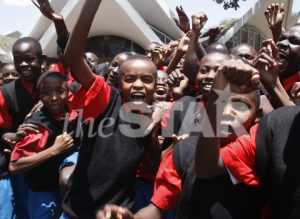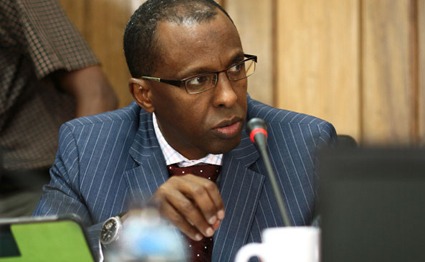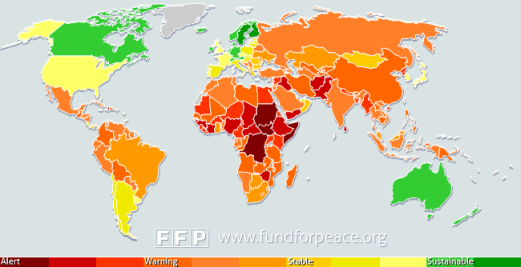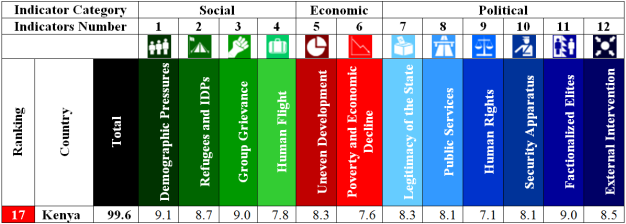Starehe Boys’ Centre is the very embodiment of that truism in policy research: that education is the greatest equalizer. It is the one instrument that rudely but happily interrupts inter-generational transmission of poverty and inequality traps, as well as well as dismantling inherited class barriers.

Bred to lead: Starehe Boys’ Centre students celebrate after the release of KCSE results
We must rescue talent from the graveyard of disadvantage or poverty. The gift of giving, the duty of serving – living for a cause larger than self, are the true marks of achievement. And talent without ethics; skill without values; and knowledge without conscience are the greatest curse that can ever befall an individual, society or nation. Just like natural resources have wrought immense suffering to undemocratic societies, so have natural talents to unconscionable individuals and communities.
The crisis facing this country in its governance and development agenda is the crisis of the elite, and the rather grotesque inversion of values: where truth is subverted, relative and even identity-driven; evidence is gutted at the slightest hint of inconvenience (Hilary Clinton has lately called this operating on an evidence-free zone); heroes and heroines become villains – those who do right are made to play defense rather than offense; and spivs command a disproportionate voice and space.
An elite or a society that rises on its feet to applaud the disregard or dishonor of an agreement and praises it as strategy, instead of condemning it as betrayal, is both sick and bankrupt. There is an over-supply of the elite, and an undersupply of values, ethics, or conscience. Whereas monetized measurements put 45% of Kenyans below the poverty line, I guess ethical instruments would have well over 90% of Kenyans living below the poverty line of values, our renowned, yet evidently suspect claim to religious piety as a nation notwithstanding. Our elite suffers from an anemic inversion of values: constantly deploying their enormous talent, skill and knowledge to aid and abet national regression projects.
Our educational system, particularly national schools such as Starehe, continues to produce the country’s political, economic, judicial, administrative elite. You are part of Kenya’s figurative ‘talented tenth’. This is the elite that runs this country and therefore must take responsibility for the country’s not-too-impressive development and governance outlook that we see 50 years after independence. The quality of our development and governance, as with all other countries all over the world, is directly a reflection of the quality of our elite. Tribalism, corruption, underdevelopment – the main scourges that afflict our country, all products of institutional dysfunctionalism – are not a creation of the masses. They are the political, economic and social toys invented by the elite for self-promotion and private gain. The unholy alliance between the two occasionally exists, but the architects, perpetrators and beneficiaries in chief are the elites.
We have an elite that ‘speaks in tongues’ – civil in the formal civic space, but quite native in motive, values, ambition, and operation. An elite that is as vernacular as the next opportunity permits, but one which cloaks its irredeemable attraction to the ‘natal centre’ with sophisticated gadgetry and technology talk. Elitism that is ephemerally modern but innately nativist. In times of crisis, and in times of opportunity; when principle is on trial or when opportunism is on offer, this elite always gravitates to the womb. You cannot build a modern, democratic society if a society’s elite has not risen to its historical mission and realize that society’s transformation is usually led by, figuratively speaking, by a talented tenth – the elite. Thinking about our situation today, the immortal words of William Butler Yeats in the poem, The Second Coming, come to mind: “Things fall apart; the centre cannot hold… the best lack all conviction, while the worst are full of passionate intensity.”
Who are the best? In this room, ladies and gentlemen, are Kenya’s elite. They have not only had a great education but have also been raised in a place of great culture and tradition. Whether you walked to school, travelled by train or bus, only flew home once a year on the army’s charity Christmas flight, you learnt to treat your classmate as your brother, your dorm mate as your confidant, your club mates as your friend. You were all treated as equals, regardless of tribe, home region or economic standing. By virtue of your high school education, you all entered into the 33 per cent bracket of those who have attained that level of education (according to the Kenya Bureau of Statistics Report, 2013). Many of you had the door to university education opened up as well, and the Starehe name continues to open many other doors to this day.
We always argue that it is the masses that choose tribal and corrupt leaders. However, how can they choose differently when that is the only choice they are practically given? I see it in the Judiciary where the ethnic leadership of a public or private institution is becoming a fairly accurate predictor of the ethnic identity of the lawyer that will be on record prosecuting the case! In most cases these two would have attended some national school, and I am sure those were not the values that they were taught. Isn’t it depressing, shouldn’t we be embarrassed, aren’t we naïve to expect us to progress as a nation when the leaders of the country, the academic, economic, legal, business and political elite of this country, cannot trust anyone outside their tribes in the most sensitive of cases?
Peter Ekeh, a Nigerian Professor of Political Science, has described the problem as one of the crisis of the two publics. The first public is that of family, clan and tribe; the second, the rest. We set different standards for different publics. Looking at the problem of corruption, how do we as the elite react? If it is someone from the first public, we look for all sorts of reasons why they should be excused. If it is the rest of the public, we rightly call upon them to carry their own crosses. Principle is variable and malleable, depending on the ethnic identity of the culprit. Identity has become the new penal code on the basis of which guilt and innocence is determined and pronounced.
Most of you think this is only a vice in the public sector; it isn’t. The private sector is even worse in terms of employment, promotion, and award of bonuses. Ethnic favouritism is rampant, ethnic concentration in recruitment prevalent and we must own up and style up.
These inverted values play out even more when we look at how we treat whistle blowers in this country. One who exposed the county’s largest corruption scandal, David Sadera Munyakei, died destitute in 2006, after being sacked from Central Bank of Kenya and remaining largely unemployed afterwards. Another was hounded and subjected to investigations for buying cheaper cars. One other was exiled both from country and community for daring to raise corruption issues. Many in the private sector have been sacked, denied promotion and bonuses for doing the right thing. Very close to home, we have seen a maddening rush to seek ethnic refuge whenever a corruption matter is raised. We cannot allow a country to have corruption as the fourth arm of government – the most powerful and the one that controls all the other arms. And corruption’s corrosive effect on democratic institutions and a country’s development become even more vile and pronounced when it intersects with ethnicity.
The Constitution of 2010 created many institutions that are now fighting for space in the public sphere. The Salaries and Remuneration Commission has sparred with both the National Assembly and the County Assemblies; Parliament has fought itself and reportedly, continues to do so with Senators and Members of the National Assembly openly differing about the importance of the two Houses. The Judiciary has also not been spared and has seen its independence threatened by many forces.
All these institutional contestations may be a necessary messy part of our democratic evolution as institutions attempt to establish the right constitutional equilibrium in their relationships under the new constitutional order. However, these contests must take place within and under the law for we are a country that professes the rule of law. No institution, no individual and no agency is above the law, and as Montesquieu, the French philosopher, memorably proclaimed several centuries back, ‘Be ye ever so high, the law is above you’.
We must choose whether we want to be a country governed by the rule of law as written in text and as pronounced by courts, or rule by man and might as is exercised by men. The former is what I see in the Constitution, 2010 and in Vision 2030. You, as the elite, must speak out when the rule of law is threatened. You must not let ethnicity or private gain colour your principle, professional calling or values. Principles and values, and on issues so central and so clear on humanity’s historical advancement such as these, have no vernacular editions. The Judiciary learnt in 1988 that even after so many years of ingratiating with those in power, the gift was the removal of the tenure of judges and the Attorney General. The ethnic identity of those judges did not matter. And neither did their business relationships. So principle pays; absence of it is costly to all.
What have we done as the elite in this room, as old Starehians? Those in the public sector have either shied away from the discussion or gone back to the two publics for answers. Others have dodged the public interest and policy questions and chosen to create private solutions for public problems. When the health sector fails, we go to private hospitals; when public education systems fail — our children attend private schools and universities. Remember always the engraving on the Assembly Hall door: To those to whom much is given, much will be required.
The forces of social evil and inequality today are so strong that we need an equally strong voice in the opposite direction. That is what the masses need — a constant dissenting but progressive voice, a clarion call for greater social change and transformation. We need to join forces for good. That is why the focus of such alumni organisations as this one must change. We must start banding together for public social change, not only for private endeavours such as exchanging business contacts.
Raise your voices above the din, on the podium of an esteemed institution, a respected institution. Speak up against the culture of crises that we have all become so accustomed to. Eliminate the poverty of ambition and values. Reframe the definition of achievement beyond self and personal to concern about your constituency, your county, your country’s achievement. The ‘talented tenth’ like you are not ornaments for ethnic display and admiration in exchange for ethnic legitimacy and ethnic patronage; you are national gems needed in the civic space. The talented tenth, like you, are not expected to navel gaze in self-satisfaction, but must see yourselves as the instrument and force of good for social transformation. Reverse the inversion of elite values as a precondition for society’s and personal development.
In the words of the Starehe motto: Natulenge Juu! Note the plurality: it is not Nanilenge juu – society is your business.
This article is reprinted verbatim from ‘The Star‘. Dr. Willy Mutunga is the Chief Justice and President of Supreme Court of Kenya. This is an excerpt of his speech presented during the Old Starehean Society annual dinner on November 20, 2013.
 A few friends have sought my irrelevant opinion on the momentous, but hardly surprising, ruling by the International Criminal Court today; that ruling leaves me strangely discontented, unsatisfied – like a starving man who has just been fed meat-flavoured air bubbles. The ruling of the Court is decisive but inconclusive, it has completed but not finished – it has neither acquitted nor condemned; it has declared that there is indeed no case to answer – but only because of grave malfeasance. There has been no justice, neither for the victims nor for the accused – process and procedure have triumphed over substance. To paraphrase, some things I do not know, some things I know – but of this, THIS I know: 1,333 fellow citizens in various places around the country did not kill themselves; or incinerate their loved ones; or rape and sodomise themselves; or maim themselves; or forcefully circumcise themselves. Hundreds of thousands did not just mindlessly and for no apparent reason abandon their homes and flee in mortal terror, even as no one pursued them. I also have absolutely no doubt that tribes were not killed, incinerated, maimed, forcefully circumcised, raped or robbed – individual invaluable human beings were, mothers and daughters, fathers and sons! Tribes did not kill, burn, maim, forcefully circumcise, rape and plunder – individual criminals did! Maybe, just maybe, when we do get to understand and accept these facts, then there will be justice for the victims of our national madness of 2007/8; and retribution for those that caused it to happen by their words and their actions – right from the mismanagement of the electoral process to the planning and implementation of the genocide. I too will be in prayer in the coming days – in earnest prayer that those that have been so grievously wronged but have lost all hope of relief shall find strength to continue living; in thankful prayer that there is justice higher than the courts, a justice that is unequivocal; and most importantly, in passionate supplicatory prayer that never again should our nation witness such sorrow and destruction. I am hopeful that my fellow believers, of all faiths, shall in the quiet secrecy of their hearts join me in these prayers – and that even those that do not believe, shall join their empathy to ours in wishing for these things.
A few friends have sought my irrelevant opinion on the momentous, but hardly surprising, ruling by the International Criminal Court today; that ruling leaves me strangely discontented, unsatisfied – like a starving man who has just been fed meat-flavoured air bubbles. The ruling of the Court is decisive but inconclusive, it has completed but not finished – it has neither acquitted nor condemned; it has declared that there is indeed no case to answer – but only because of grave malfeasance. There has been no justice, neither for the victims nor for the accused – process and procedure have triumphed over substance. To paraphrase, some things I do not know, some things I know – but of this, THIS I know: 1,333 fellow citizens in various places around the country did not kill themselves; or incinerate their loved ones; or rape and sodomise themselves; or maim themselves; or forcefully circumcise themselves. Hundreds of thousands did not just mindlessly and for no apparent reason abandon their homes and flee in mortal terror, even as no one pursued them. I also have absolutely no doubt that tribes were not killed, incinerated, maimed, forcefully circumcised, raped or robbed – individual invaluable human beings were, mothers and daughters, fathers and sons! Tribes did not kill, burn, maim, forcefully circumcise, rape and plunder – individual criminals did! Maybe, just maybe, when we do get to understand and accept these facts, then there will be justice for the victims of our national madness of 2007/8; and retribution for those that caused it to happen by their words and their actions – right from the mismanagement of the electoral process to the planning and implementation of the genocide. I too will be in prayer in the coming days – in earnest prayer that those that have been so grievously wronged but have lost all hope of relief shall find strength to continue living; in thankful prayer that there is justice higher than the courts, a justice that is unequivocal; and most importantly, in passionate supplicatory prayer that never again should our nation witness such sorrow and destruction. I am hopeful that my fellow believers, of all faiths, shall in the quiet secrecy of their hearts join me in these prayers – and that even those that do not believe, shall join their empathy to ours in wishing for these things.



